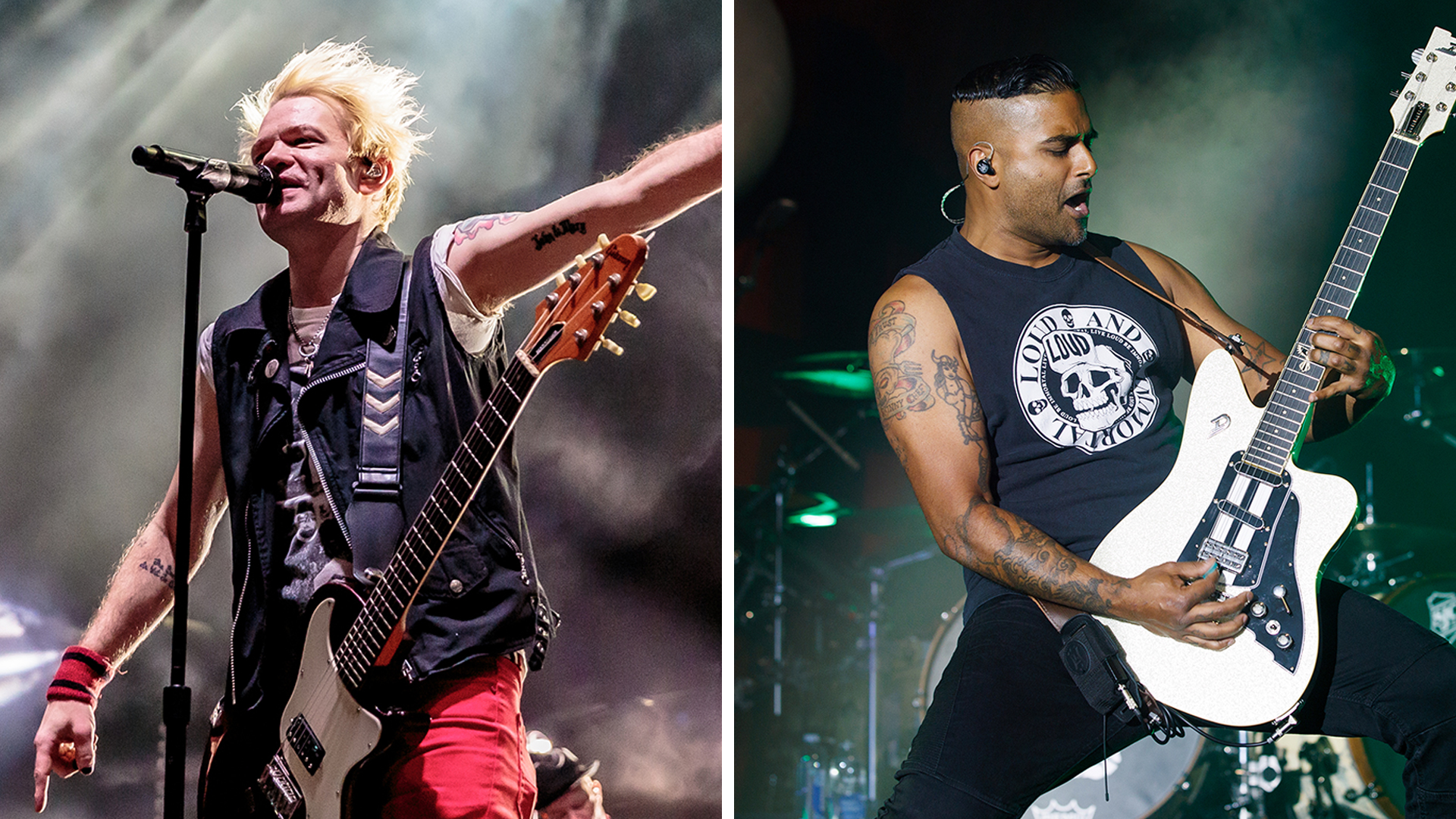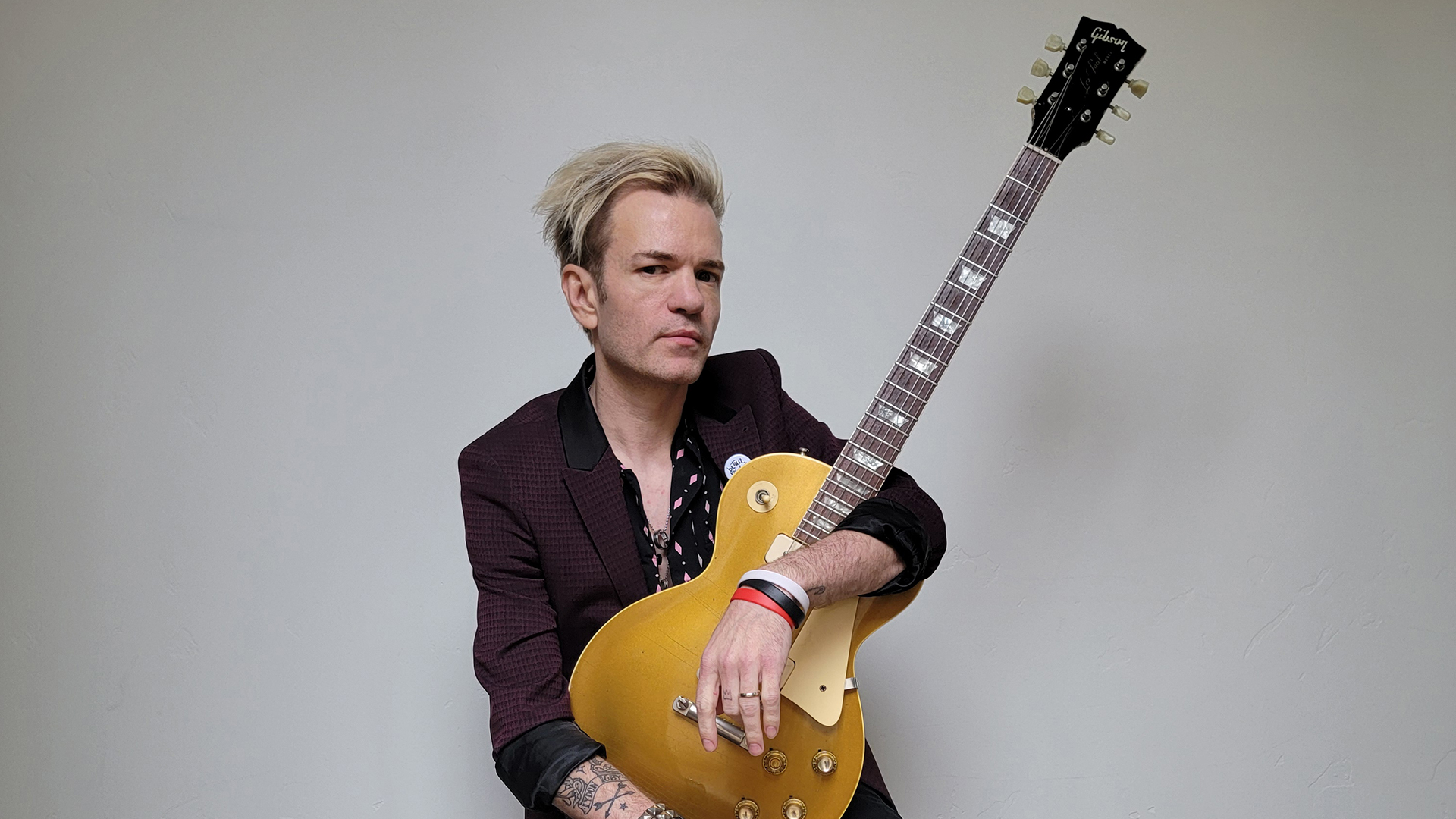
Since the late ’90s and early ’00s, Sum 41’s Deryck Whibley and Dave Baksh have shown a blatant disregard for the supposedly established confines of the bouncy, made-for-MTV genre of pop-punk. Records like All Killer No Filler (2001) and Does This Look Infected? (2002) were edgy when compared to records by their contemporaries.
But if Whibley, a songsmith who can rattle off catchy tunes with the best of ’em, and Baksh, a raging metalhead at heart, cared about such a lack of integration with the masses, they never showed it.
Sum 41’s shred-head meets pop-laden sound has produced a hell of a lot of hits over the years, combining the hell-on-Earth antics of the Sex Pistols with the sweet melodies of Green Day. But a new double album, Heaven :x: Hell, will be the band’s last, putting a full stop on a career that’s brought them everything and more.
Some will say it’s too soon, as Deryck and Dave are both just 43, but the decision isn’t arbitrary.
“I was given a choice whether to pursue education or Sum 41, and that was the last real gamble I took,” Dave says.
“I can’t explain what this band has meant to me. The people that have followed this band, and who welcomed me back after I left, outside my family, have been everything. This gave me the life I’ve dreamed of having, and so, to go out on top like this and not just be a band to make money off fans, that’s everything, too.”
Sum 41 might always be remembered as snotty kids who penned sneering tracks like Fat Lip and Still Waiting, but there is no doubting the emotions in play as Deryck thinks about this final album and the following trip around the world, wryly billed as the Tour Of The Setting Sum.
“This was a difficult decision to come to,” he says. “It was a long process, and kinda feels like a divorce taking a long time to walk out the door from. We still love each other, the music, and the fans. I don’t know what the end feels like – I’m sure I’ll be sad, and it’s terrifying. But I’m excited. I needed to remove the safety net, and I needed the urgency of something else.”
If I’m doing Sum 41, I’m all-in on Sum 41. Maybe this will allow me to do other things I’ve wanted to do in my career
Dave Baksh
Are you absolutely sure that this is the right time to finish?
Deryck: “I’ve been thinking, ‘This is all I’ve ever done since I was 15’ – meaning be the singer of Sum 41. For the past few years, I’ve been getting to a point where I want to do something new. I’ve got other ideas, and I can’t dive into them because this band takes up my entire life. As much as I love it, I wonder if there’s more out there. I won’t know until I try, and if I’m doing Sum 41, I’ll always get pulled back in.”
Dave: “It’s bittersweet. There is a love of what we do – it’s incredible. But we also want to pursue other things, and I’m not a good multi-tasker. If I’m doing something I’m all-in on it. So, if I’m doing Sum 41, I’m all-in on Sum 41. Maybe this will allow me to do other things I’ve wanted to do in my career.”
And with this stellar new album you can go out on a high.
Deryck: “A lot of this record was by accident! The pop-punk stuff had always come by accident, but with this album, many people were asking about that stuff. It had been a long time since I wrote that way, as we’re more on the heavy side now, but I decided to try and see if I could still write something pop-punk.
“I got going with that and thought, ‘F*ck, I actually like these songs!’ I didn’t want to give them away, and when the heavier stuff started happening, I said, ‘This could be a double album…’”
Dave: “For the last few records, we’ve adopted the Slayer approach, and once the music started to come together, I could apply that – especially to the more metal-sounding stuff. I’m not the only metal fan in the band, and there are multiple performances with over-the-top rhythms and cool solos.
“Deryck’s writing style tends to err toward old-school thrash, which lends itself to that classic pentatonic, slow build-to‑a‑high-point type of thing.”
Your guitar approaches complement each other, regardless of style.
Deryck: “We played left and right for the early records – specifically the first two. I’d be on the left and Dave on the right. Back then, I played more guitar solos, but we settled into a space where I played most of the rhythm parts and Dave the leads, and that’s what we do now. We don’t trade off as much as we used to, and Dave takes on more of the shreddy stuff.”
Dave: “A good example of that are two songs from the new album called Rise Up and Stranger In These Times. I’m on the metal side of things, but I also get into the punk stuff, and songs like that feel so natural regarding how we do guitars. I have become more conscious of when to be ahead of the beat or lay back. With that approach, even our old songs feel fresh.”
As I understand it, Deryck acquired a Gibson Les Paul Goldtop previously used by Mike Ness from American punk legends Social Distortion. Did you use that on this record?
Deryck: “I have a huge guitar and amp collection. I’ve got a ’59 Les Paul reissue, a white ’63 SG, and a Les Paul Jr that I’ve had since the ’90s. I used the SG a lot because it’s got P-90s, which I love. They have so much attitude, but I’ll always fall back on a good Les Paul. As for the Goldtop, it’s a ’68, and it’s the same guitar Mike Ness used in the ’90s.
“I was into Social Distortion’s White Light, White Heat, White Trash record, and that guitar sounds just like that. I’ve always loved that guitar – I’m mesmerised by that sound. So when [producer] Michael Beinhorn put it up for sale, I had to have it. I’ve had years of listening to that Goldtop, and now, I own it, and I’ll take it on tour.”

Dave, what guitars are you leaning on most at the moment?
Dave: “I’m still mainly using my Duesenberg Alliance Series, my signature guitar. I had gone to a local music store and found a Malcolm Young Gretsch with a single TV Jones pickup and a light body, and it sounded so good.
“I had attempted to make a guitar like it with other companies, and they even offered me a signature, but I wanted it to be just right. It took me over 20 years to go with a company, and then I got with Duesenberg, and my Alliance Series guitar was born.”
With this being your final tour, you must be dialling in your respective rigs. What does that process look like for you both now?
Deryck: “The biggest change is we don’t use live amps anymore. We use Kempers, and I’ve got all these amazing profiles loaded in. I had this ’71 Fender Super Bass that was modded, and we had that on tour for years, but it would break down daily.
“I profiled it, retired that, and we still have it. That’s the biggest change. I never use pedals – I’m just guitar and amp. I’m excited about that because the sound of the ’68 Goldtop is just so amazing!
Dave: “The Kemper thing is big. I used to use Marshalls and had this hand-wired Plexi, but as Deryck said, we’ve got all these profiles now. He’s got the Super Bass in there, and we’ve also got the Plexi, and there’s even some Suhr and other good mods in there. I know they’re profiles, but there’s a lot of soul to them, and they cover just about every situation.:
I used to be fearful that I’d lose my songwriting ability or never have a hit, but now we’ve just made a record we could go out on
Deryck Whibley
And finally, do you have any regrets when you look back on Sum 41?
Deryck: “There was more anxiety in the early days, but I’m more relaxed now. Life has ups and downs, but I’ve always been on a path toward happiness. I used to be fearful that I’d lose my songwriting ability or never have a hit, but now we’ve just made a record we could go out on. It all worked out, so I’m never worried about where life will take me.”
Dave: “I regret that when we were 20, we didn’t think there was enough pie to go around, but that’s part of being young and slugging it out. The early days can be compared to doing magic mushrooms with your friends, but that’s just an entry point.
“Our music is funny and bright but also the darkest sh*t you have ever heard. I’m just concentrating on enjoying this beautiful thing and feeling the crowd’s energy one last time.”
- Heaven :x: Hell is out now via Rise.







